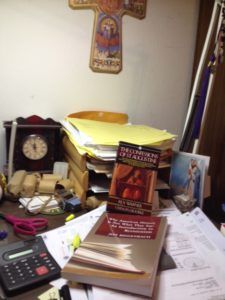Monday

Miscellaneous Rambling
Christmas neareth. Far out. This coming week is typically my favorite time of the year: work starts to slow down, older kids start to return home.
Unfortunately, my week got off to a rough start Saturday night. I attended Mass in a neighboring village and an older man verbally accosted me after Mass, furious that I look at my phone during Mass. There was no opportunity to explain that I have my prayers on the phone; I believe it borders on grave matter to be intentionally distracted during Mass; I occasionally make a note to myself about something secular that pops in my head during Mass so I remember to address it later, thereby allowing me to stop thinking about during Mass, etc. This guy honestly struck me as though he wanted to get in a fistfight in the pews. I later found out who he was and called to explain myself and to apologize for causing any offense. He wasn't having it (he assured me I was lying, I am to leave my phone in my car, I'm paying my bills during Mass, this conversation is over, click). Unbelievable. As of this typing, I'm still stunned.
So be forewarned: If you're on your phone, people will assume the worst. We're best off not using the phone during Mass. It's not worth aggravating others. I was actually a bit worried Saturday night that the guy was going to have a stroke, all because he was convinced I wasn't worshipping properly.

The new podcast is up: Post-Modernism, Galileo and Mead and Kinsey and Other Frauds, Arthur Koestler. The Show Notes:
Post-Modernism Studies Have Begun: I bought Thaddeus Russell's course, “What is Post-Modernism.” I like it, but I think I've caught three pretty bad errors in the first 20 minutes or so: Margaret Mead's findings were terribly flawed, Copernicus didn't suffer severe persecution, Galileo wasn't persecuted because he was correct.
Christians and Post-Modernism: Joseph Bottum corroborates my hunch: Post-modernism is attacking traditional Christianity's enemy, modernism, so we have a lot of common ground.
Galileo: What very few people know: Galileo was wrong. His conclusions were right, but his rationale was wrong. He couldn't prove what he was saying, but rather, expected everyone to accept his conclusions based on the strength of his (supposed) superiority to everyone else. He ended a broken man . . . pride goeth before the fall.
Arthur Koestler: A #metoo villain from the mid-twentieth century. No doubt a creep, but probably a genius, intellectually honest, and interesting.



